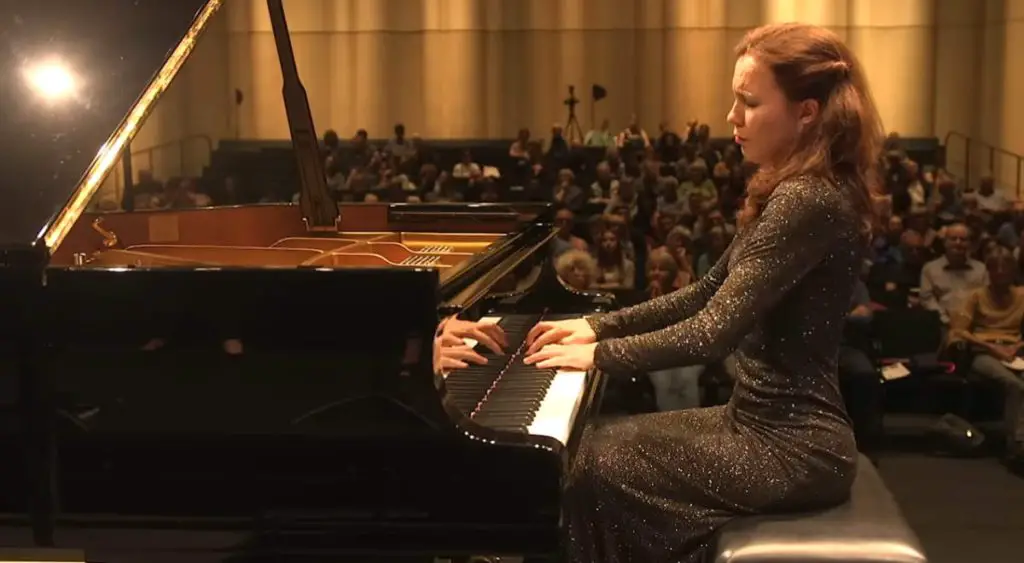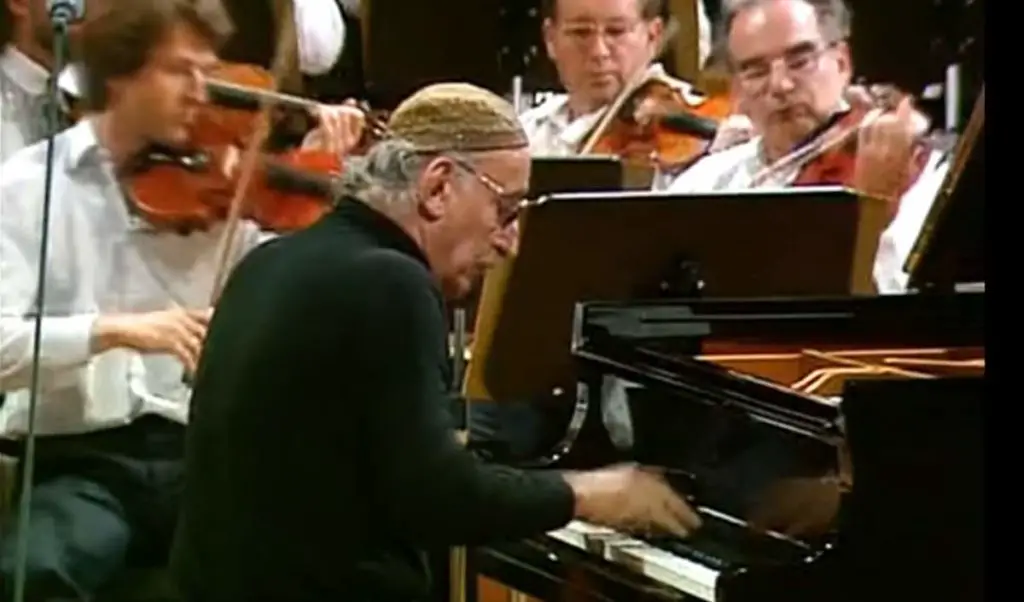Accompanied by the PreCollege Orchestra Zürich, classical pianist Yulia Miloslavskaya performs Wolfgang Amadeus Mozart’s Piano Concerto No. 20 in D minor, K. 466. Conductor: Hartmut Haenchen. Recorded on October 1, 2017, in Zurich, Switzerland.
Mozart’s Piano Concerto No. 20
Mozart’s Piano Concerto No. 20 in D minor, K. 466, is one of his most celebrated and emotionally profound works. Composed in 1785, it stands out for its dramatic intensity and the dark, turbulent mood that pervades much of the piece, setting it apart from many of his other piano concertos, which are generally lighter and more cheerful in character. The D minor key, rare in Mozart’s compositions, gives the concerto a sense of foreboding and emotional depth, marking it as one of his most serious and powerful works for the piano.
The concerto’s orchestration plays a significant role in its distinctive sound. Unlike some of Mozart’s other concertos, this one prominently features wind instruments, including the use of oboes, bassoons, and horns, which add to the richness and complexity of the soundscape. The dramatic dialogue between the orchestra and solo piano is one of the most compelling aspects of the concerto. At times, the orchestra seems to overwhelm the soloist, creating a sense of struggle or conflict, while at other moments, the piano takes on a more lyrical, expressive role, offering moments of introspection amidst the tension.
Technically, the concerto is demanding for the pianist, requiring not only dexterity but also an ability to convey the deep emotional currents that run through the piece. The interplay between light and shadow, tension and release, makes this concerto one of Mozart’s most nuanced and emotionally layered works. It has been admired not only for its technical brilliance but also for its psychological depth, qualities that make it a favorite among performers and listeners alike. The concerto’s powerful blend of drama, lyrical beauty, and complexity has earned it a prominent place in the piano repertoire, with later composers such as Beethoven and Brahms drawing inspiration from its bold expressiveness.
It is only one of two piano concertos written by Mozart in a minor key (with No. 24 in C minor being the other), and the most overtly dark, dramatic, and impassioned.
Movements
1. Allegro
The first movement of Mozart’s Piano Concerto No. 20 in D minor, marked Allegro, immediately sets a dramatic and somber tone. The orchestra opens with a stark, pulsating rhythm, outlining the dark character of D minor, which establishes a sense of urgency and foreboding. This introduction is full of tension, with dynamic shifts and sharp contrasts between the strings and winds, creating a turbulent atmosphere that permeates the entire movement.
When the piano enters, it doesn’t offer immediate resolution to the orchestral tension but rather heightens it. The soloist’s part introduces a lyrical, yet introspective, theme that weaves through the orchestra’s restless texture. The piano plays a dual role—sometimes delicate and contemplative, and at other times boldly asserting itself against the dramatic orchestral forces. The contrast between the orchestra’s weighty, stormy presence and the piano’s more fluid, introspective voice is a central feature of the movement.
Mozart uses striking harmonic shifts, moving between the dark D minor and moments of light, giving the movement a constantly shifting emotional landscape. The development section amplifies the tension, with rapid passages and intricate exchanges between the piano and orchestra. The music builds toward moments of intense drama, only to retreat into more reflective, quieter passages.
The movement concludes with a forceful and unresolved coda, leaving the listener in a state of emotional suspense. Its blend of dramatic intensity and lyrical beauty has made this movement one of the most compelling in Mozart’s piano concerto repertoire, reflecting his mastery of both form and emotional expression.
2. Romanze (a five-part rondo -ABACA- with a coda)
The second movement of Mozart’s Piano Concerto No. 20 in D minor, marked Romanze, offers a striking contrast to the stormy first movement. Set in a serene B-flat major, it unfolds with a gentle, lyrical theme that evokes a sense of calm and simplicity. The piano introduces the main theme with a tender, singing quality, accompanied softly by the orchestra. This movement is marked by its graceful elegance and delicate phrasing, allowing the soloist to showcase a more lyrical, expressive side of Mozart’s writing.
The music flows with a sense of natural ease, and the dialogue between the piano and orchestra is warm and intimate. Unlike the tension-filled exchanges of the first movement, here the piano and orchestra support each other, creating a sense of harmony and balance. The melodic lines are clear and uncluttered, with Mozart exploring subtle variations on the main theme that highlight the piano’s expressive range.
However, this peaceful atmosphere is briefly interrupted by a contrasting middle section in G minor, where the music becomes darker and more agitated. The piano’s once gentle voice becomes more dramatic, and the orchestral texture grows heavier, bringing a sudden sense of tension. This episode feels like a brief echo of the first movement’s turbulence but is eventually resolved as the music returns to the calm, flowing theme from the opening.
The movement closes with a return to the serene and graceful mood, leaving a lasting impression of beauty and tranquility. This balance between light and shadow makes the second movement one of the most poetic and reflective sections of the concerto.
3. Allegro assai (a rondo)
The third movement of Mozart’s Piano Concerto No. 20 in D minor, marked Allegro assai, brings the concerto to a dramatic and energetic conclusion. Returning to the stormy and intense character of the first movement, this finale is filled with urgency and a sense of driving momentum. The movement begins with a bold, rhythmically assertive theme introduced by the orchestra, immediately creating a sense of forward motion. The piano soon joins with its own brisk, virtuosic passages, engaging in a lively and often dramatic dialogue with the orchestra.
Throughout the movement, Mozart plays with contrasts, moving between sections of tense, rapid exchanges and lighter, more playful moments. The piano part is demanding, requiring technical brilliance as the soloist navigates fast-paced scales, arpeggios, and intricate figurations. At times, the piano seems to challenge the orchestra, pushing the tempo and intensity forward, while the orchestra responds with equal force, creating a sense of dynamic interplay.
A central feature of the movement is the shifting between major and minor tonalities, which adds to the emotional complexity. Despite the overall sense of urgency, there are moments of respite where the music softens, only to be quickly swept back into the rapid pace of the main theme. As the movement progresses, the tension builds toward a climactic coda.
In a surprising turn, the concerto concludes in D major, a bright and triumphant resolution to the dark, dramatic journey of the piece. This unexpected shift to the major key brings a sense of closure and optimism, making the finale both exhilarating and uplifting after the intensity of the earlier movements.
Yulia Miloslavskaya
Yulia Miloslavskaya was born into a musical family, showing great interest in music from her earliest years. Upon graduating from music high school in 2004 (class of
Nelli Sokolova) entered the Moscow Conservatory where her professors included the notable pianists Naum Shtarkman and Ruvim Ostrovsky.
Resident in Switzerland since 2010, she continued her musical education as a student of Konstantin Scherbakov (Concert Diploma and Diploma in Music Pedagogy) and Peter Solomon (orchestra piano, harpsichord, and organ).
An extensive repertoire and outstanding skills have won her prizes and acclaim at several renowned international competitions (including the International Adilia Alieva Competition in Gaillard, France; Jean Francaix International Competition, Paris; Kiwanis Competition and Landolt Competition, Zurich; Kiefer Hablitzel Competition, Bern; IBLA Competition, Ragusa Ibla, Italy; Concours musical de France, Paris).

She has participated in numerous masterclasses (with Konstantin Scherbakov, Vera Gornostaeva, Liliya Zilberstein, Robert Levin, Dmitri Bashkirov, Homero Francesch, Ulrich Koella, Henri Sigfridsson, and David Zinman).
Miloslavskaya was also awarded scholarships by the Marguerite Meister and Rahn Foundations in Zurich.
Her pianistic activities are not confined to solo performances: she also plays in various ensembles, duos, trios, and other musical groups.
She has performed together with Konstantin Scherbakov and Emanuel Ax (piano), Martin Grubinger, and Rainer Seegers (percussion), Alexander Rudin and Thomas Grossenbacher (cello), Ilya Gringolts and Andreas Janke (violin).
As a soloist, chamber, and orchestral musician she performs at international festivals including Herbst in der Helferei, Musiksommer am Zurichsee, Pro Nota-Konzerte Nordhorn, Rainbow 21 in Suntory Hall Tokyo, Zurcher Festspiele, BSI Festival Engadin, and the Menuhin Festival in Gstaad and gives recitals in Switzerland, France, Germany, Italy, Brazil, Russia, and Japan.
Other engagements, for example as a church organist in Wildberg ZH and musical assistant, harpsichordist, and organist at the OperOderSpree Festival (Germany) testify to Yulia’s versatility.
As an orchestra pianist, she has performed under conductors including David Zinman,
Franz Welser-Most, Karl-Heinz Steffens, Manfred Honeck, Esa-Pekka Salonen, Marc Kissoczy, Pierre-Andre Valade and Lionel Bringuier.
In 2015, Yulia released her first Album “Novelettes” on Yartista, including the works by F. Chopin, F. Liszt, C. Debussy, S. Rachmaninow, and F. Poulenc.
In recent years she has formed a close relationship with Giraud Ensemble Chamber Orchestra. Recordings for Yartista include Piano Concerto by D. Schostakovich (Album “Primus”, 2017).
More recently she has recorded Poulenc’s Concerto for two pianos and orchestra for Solo Musica/ Sony Music.
Yulia is a lecturer and accompanist at the Zurich University of Arts.
Sources
- Piano Concerto No. 20 (Mozart) on Wikipedia
- Yulia Miloslavskaya official website


